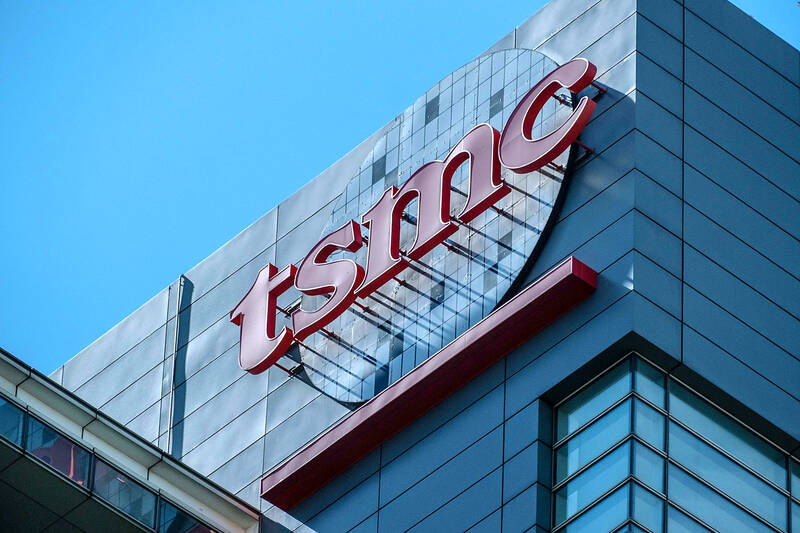Taiwan Semiconductor Manufacturing Co (TSMC, 台積電) has suspended production of advanced silicon for Chinese start-up Biren Intelligent Technology Co (壁仞科技) to ensure compliance with US regulations, a person familiar with the matter said.
The decision is connected with information in the public domain that Biren’s products outperform Nvidia Corp’s A100 chips, which are banned for the Chinese market, the person said, asking not to be identified discussing a sensitive matter.
While TSMC has not reached a conclusion on whether Biren’s products meet the US threshold for restrictions, the chipmaker has decided to stop supplies to the Chinese start-up for now, the person said.

Photo: Lam Yik Fei, Bloomberg
Biren, one of China’s most promising semiconductor designers, earlier concluded its artificial intelligence (AI) chips produced by TSMC are not covered by the latest US export restrictions because the specs of its products do not meet the criteria for curbs, Bloomberg reported on Friday.
A representative for TSMC declined to comment further. No one at Shanghai-based Biren was immediately available to respond to requests for comment outside of regular business hours.
Biren is considered a domestic contender to compete with graphics chips from Nvidia, which has said it can no longer sell its most advanced AI products into China. The US measures were designed to limit China’s development of technology that might be used to aid its military, and appeared to rule out access to advanced fabrication.
The US Department of Commerce’s Bureau of Industry and Security (BIS), which plays a key role in designing and enforcing export controls, announced the semiconductor restrictions on Oct. 7.
“While BIS cannot comment on company-specific actions, we expect all companies to comply with export controls,” a commerce department spokesperson said in a response to an earlier query on TSMC’s business relationship with Biren. “Since the release of the rule on Oct. 7, BIS has been undertaking a vigorous outreach effort to educate those impacted by it to aid compliance efforts.”
TSMC, the world’s largest contract chipmaker, complies with all relevant regulations and “will continue to serve all customers around the world,” chief executive officer C.C. Wei (魏哲家) said in response to a question about China during its earnings call on Oct. 13.

The Central Election Commission has amended election and recall regulations to require elected office candidates to provide proof that they have no Chinese citizenship, a Cabinet report said. The commission on Oct. 29 last year revised the Measures for the Permission of Family-based Residence, Long-term Residence and Settlement of People from the Mainland Area in the Taiwan Area (大陸地區人民在台灣地區依親居留長期居留或定居許可辦法), the Executive Yuan said in a report it submitted to the legislature for review. The revision requires Chinese citizens applying for permanent residency to submit notarial documents showing that they have lost their Chinese household record and have renounced — or have never

A magnitude 5.6 earthquake struck off the coast of Yilan County at 12:37pm today, with clear shaking felt across much of northern Taiwan. There were no immediate reports of damage. The epicenter of the quake was 16.9km east-southeast of Yilan County Hall offshore at a depth of 66.8km, Central Weather Administration (CWA) data showed. The maximum intensity registered at a 4 in Yilan County’s Nanao Township (南澳) on Taiwan’s seven-tier scale. Other parts of Yilan, as well as certain areas of Hualien County, Taipei, New Taipei City, Taoyuan, Hsinchu County, Taichung and Miaoli County, recorded intensities of 3. Residents of Yilan County and Taipei received

Taiwan has secured another breakthrough in fruit exports, with jujubes, dragon fruit and lychees approved for shipment to the EU, the Ministry of Agriculture said yesterday. The Animal and Plant Health Inspection Agency on Thursday received formal notification of the approval from the EU, the ministry said, adding that the decision was expected to expand Taiwanese fruit producers’ access to high-end European markets. Taiwan exported 126 tonnes of lychees last year, valued at US$1.48 million, with Japan accounting for 102 tonnes. Other export destinations included New Zealand, Hong Kong, the US and Australia, ministry data showed. Jujube exports totaled 103 tonnes, valued at

BIG SPENDERS: Foreign investors bought the most Taiwan equities since 2005, signaling confidence that an AI boom would continue to benefit chipmakers Taiwan Semiconductor Manufacturing Co’s (TSMC, 台積電) market capitalization swelled to US$2 trillion for the first time following a 4.25 percent rally in its American depositary receipts (ADR) overnight, putting the world’s biggest contract chipmaker sixth on the list of the world’s biggest companies by market capitalization, just behind Amazon.com Inc. The site CompaniesMarketcap.com ranked TSMC ahead of Saudi Aramco and Meta Platforms Inc. The Taiwanese company’s ADRs on Tuesday surged to US$385.75 on the New York Stock Exchange, as strong demand for artificial intelligence (AI) applications led to chip supply constraints and boost revenue growth to record-breaking levels. Each TSMC ADR represents